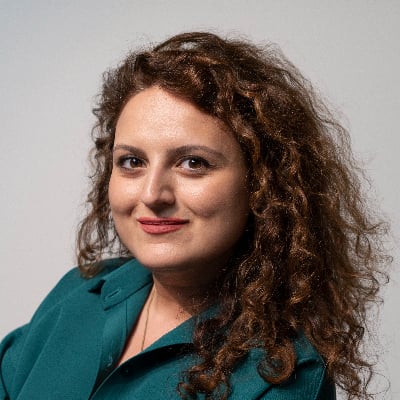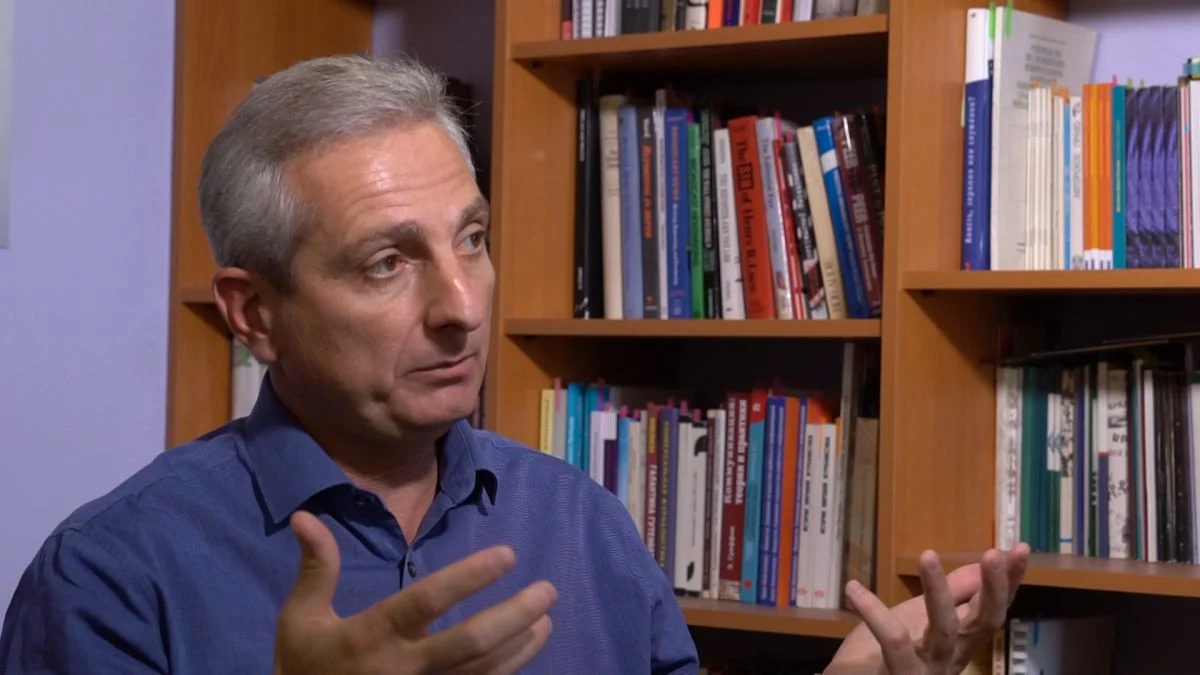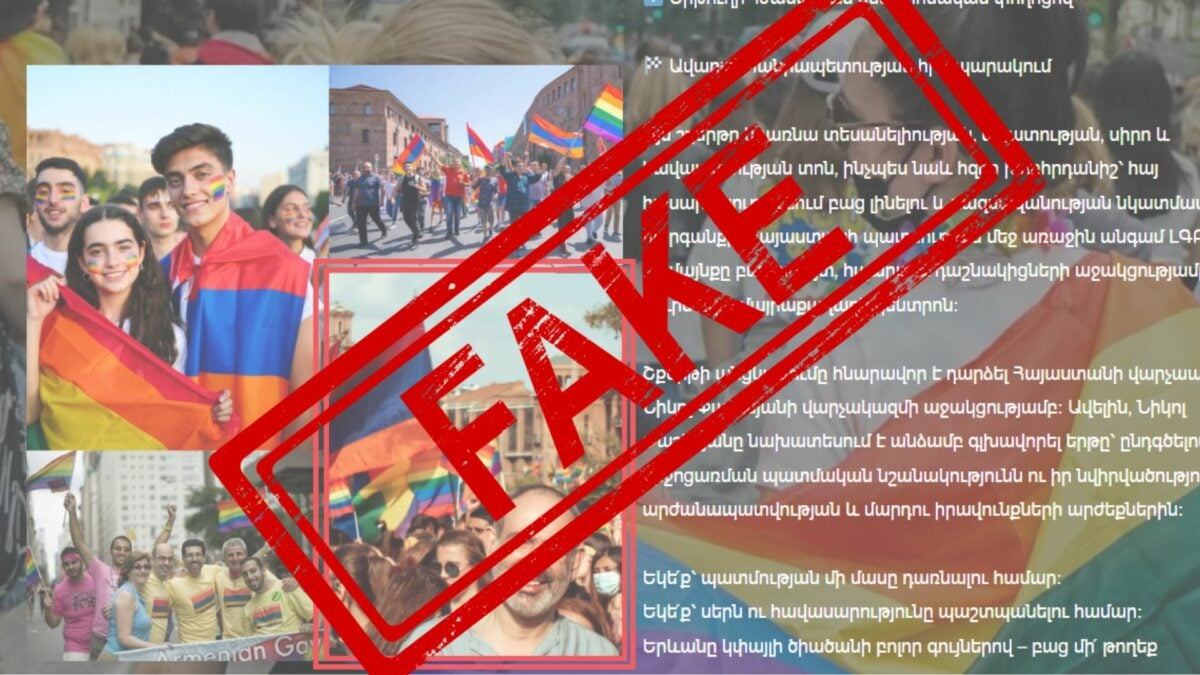It was reported last week by “Aravot” that a new criminal case has been initiated against Avetik Ishkhanyan, the chairman of “The Helsinki Committee of Armenia” NGO, due to his Facebook post from September 20, 2023.
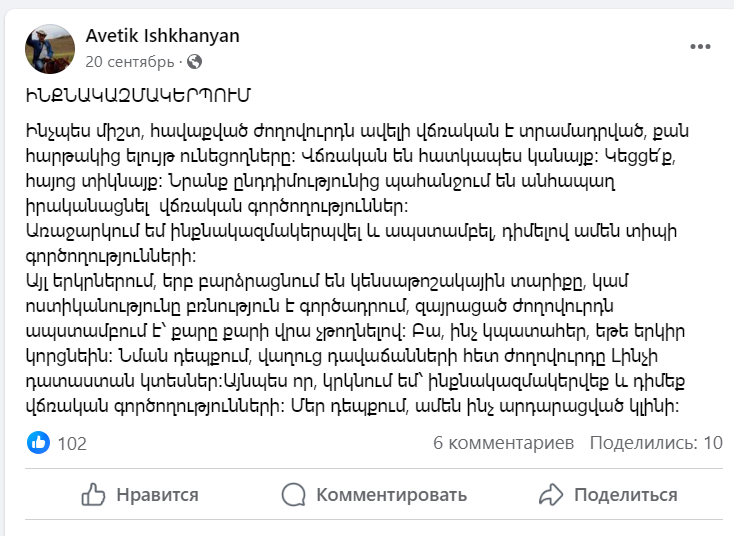
In his Facebook post, he wrote that the gathered people were more determined than those speaking from the platform, especially the women. He demanded immediate, decisive action from the opposition and suggested that they organize themselves and rebel, resorting to all kinds of actions. He pointed out that in other countries, when the retirement age is raised or the police use violence, angry people revolt, leaving no stone unturned. It was pointed out that if they lost the country, the people would have seen a lynch judgment with the traitors long ago.
As per the online publication of “Aravot,” the legal case was launched under the provisions of the third clause of the second section of Article 330 of the Criminal Code. This clause pertains to “publicly inciting violence, publicly justifying or promoting violence through media or communication technologies.”
This is the second criminal proceeding initiated against Ishkhanyan under the same article.
The first was in 2023 for the “Death to Traitors” Facebook post on September 19.
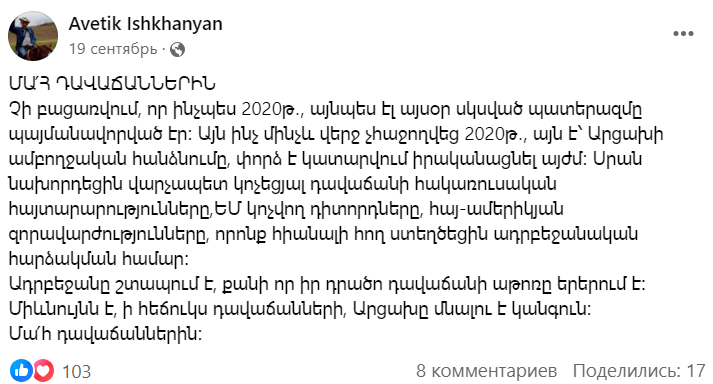
The Facebook post expressed strong sentiments against perceived traitors and discussed the possibility that the ongoing conflict since 2020 may be intentional. He accused the Prime Minister of making anti-Russian statements, implicating EU observers, and suggested Armenian-American military exercises paved the way for an Azerbaijani attack and linked the urgency in Azerbaijan’s actions to internal instability.
After the information regarding a new legal case was published, Ishkhanyan took to Facebook to express his surprise, stating that he was unaware of the case.
He further added, “As I did in the previous criminal case, I want to make it clear that I stand by the content of my notes, and I refuse to provide any statement to the investigators who are merely following orders.”
International law specialist Ara Ghazaryan has stated that initiating a criminal case against Avetik Ishkhanyan for both of his posts is an excessive action. Ghazaryan points out that even if the first post contains insulting language towards a political leader, there are no facts to support that the post posed a public threat or aimed to undermine the constitutional order.
“I propose that administrative proceedings should be initiated in cases of public insults, and an administrative penalty should be imposed instead of a criminal one in the Republic of Armenia. The facts indicate that no direct consequences followed Ishkhanyan’s September 19 statement. In my opinion, Ishkhanyan was merely protesting against the loss of the war when he used an insulting word against the Prime Minister in his speech. However, it is not a call for violence or a word of hatred,” stated Ara Ghazaryan.
About the Facebook post from September 20, which formed the basis of the second proceeding, it is essential to note that there are two key aspects to the crime. Firstly, the concrete actions (the objective characteristic) and the intention behind those actions (the subjective characteristic). The purpose must be to incite violence against a minority group due to hatred towards them, with the reason for such hatred being related to their ethnicity, language, religion, or other factors. Ara Ghazaryan points out that Ishkhanyan’s note includes none of the listed elements.
“It’s simply a call from a human rights defender to take to the streets in protest. If we consider the call to protest as a call to violence, it implies that the political struggle in Armenia should cease. It would be hate speech and a call to violence when, for instance, I suggested that all Indians in our country should be forcibly expelled, displaying a targeted approach towards a minority based on ethnicity,” says Ara Ghazaryan.
Before labeling any publication as a call to violence or hate speech and initiating a criminal case, the international law specialist emphasizes the importance of considering the context.
“When considering a speech, it is important to take into account the context in which it was spoken, particularly if it relates to political or social tensions. The words spoken can express a concern or a matter of public significance. In this case, it was Armenia’s defeat in Karabakh, which must be considered,” says Ghazaryan.
It’s important to consider who makes the statement – whether it’s an ordinary citizen, a politician, a law enforcement officer, or a journalist. According to Ghazaryan, human rights defenders don’t have specific rules to follow like public servants do. If a human rights defender makes a problematic statement or post, they are unlikely to promote violence deliberately, violate public order, or incite riots. Instead, their intention may be to spark an open public debate on a public issue or to bring attention to an important topic.
“It is a challenging task to persecute human rights defenders and journalists since they always have the last word, and their reaction is significant. According to the international law specialist, when a criminal case is initiated, and the evidence is inefficient, looking for a hidden agenda is essential. In this case, the hidden agenda is to silence the human rights defender.”
He mentioned that there aren’t many criminal cases against human rights defenders in Armenia, as such cases often face significant public resistance and draw harsh criticism from human rights organizations. However, he observed that the current situation is different.
According to Ara Ghazaryan, arresting a human rights defender can create significant issues and negative publicity for any country under international law. Such an arrest can be viewed as an act against political freedoms and may result in the defender being classified as a political prisoner; this can severely damage the country’s reputation.
According to Ghazaryan, one of the reasons for the created situation is the legislative gap, resulting in similar cases receiving a criminal-legal response. He suggests terminating the proceedings initiated based on Avetik Ishkhanyan’s notes.
To prevent the use of offensive language on social media and in public areas, administrative and legal mechanisms should be established to impose penalties on those who disrupt public order.
